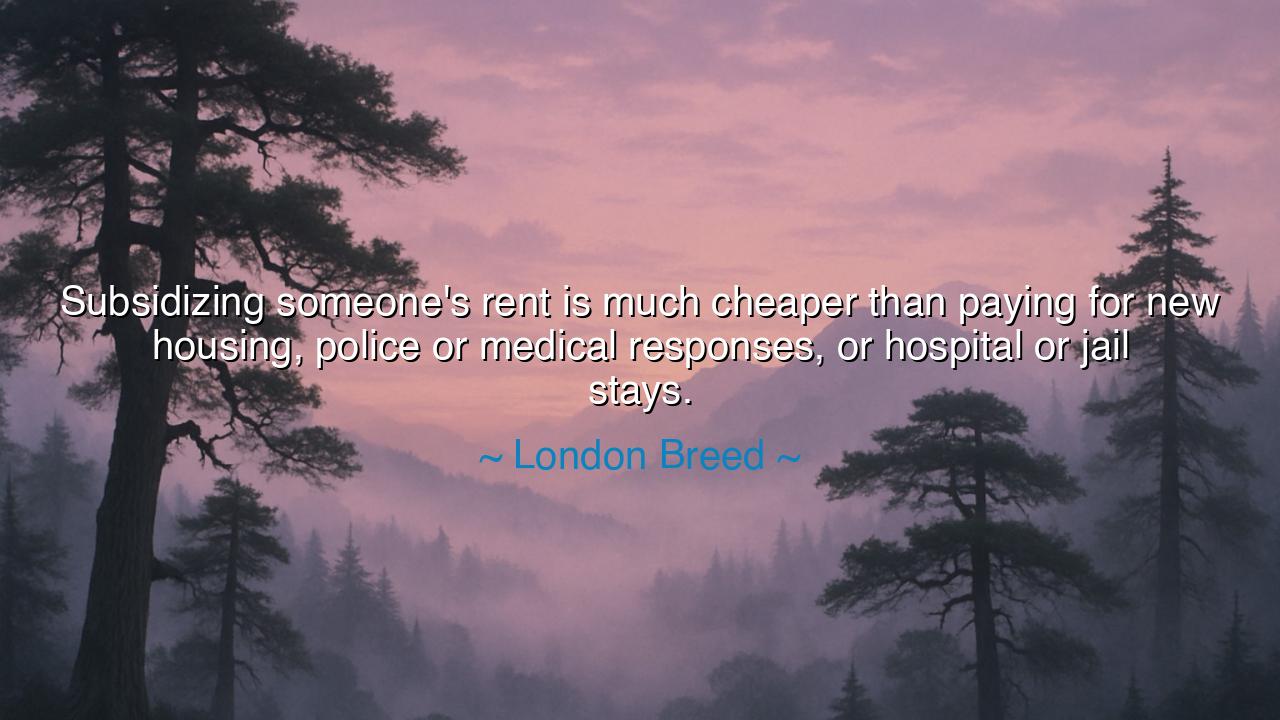
Subsidizing someone's rent is much cheaper than paying for new
Subsidizing someone's rent is much cheaper than paying for new housing, police or medical responses, or hospital or jail stays.






“Subsidizing someone’s rent is much cheaper than paying for new housing, police or medical responses, or hospital or jail stays.”
Thus spoke London Breed, leader of San Francisco, one who has walked among both the towers of power and the forgotten streets of hardship. Her words carry not the cold precision of economics, but the ancient fire of wisdom—the understanding that mercy, when applied early, saves both treasure and soul. For in this simple statement lies a truth that all just societies must learn: it is far wiser to prevent suffering than to pay for its consequences.
Breed’s words emerge from the battleground of urban struggle, where homelessness and poverty often meet with policy and politics. In her city, and in cities across the world, the cost of neglect has become unbearable—both in coin and in conscience. By saying that helping one afford rent is cheaper than building prisons or paying hospital bills, she reminds us that compassion is not only moral, it is practical. The ancient philosophers would have called this prudence, the virtue of foresight—the ability to see that every act of kindness sows the seeds of peace, while every act of indifference breeds the weeds of chaos.
This truth is older than civilization itself. In the laws of old Mesopotamia, rulers understood that when farmers lost their homes to debt, famine followed; and when famine came, rebellion came after. To keep the people housed was not mere charity—it was stability. In the same way, Breed’s words reflect a timeless law of human harmony: that security of shelter is the root from which all other forms of order and health grow. Remove the roof from over a person’s head, and you strip them not only of protection, but of dignity, purpose, and peace.
We see this wisdom echoed in history’s great reformers. Franklin D. Roosevelt, during the Great Depression, declared that the test of progress was not whether we added to the wealth of the prosperous, but whether we provided enough for those who had too little. His New Deal housing programs were born from the same truth that Breed now speaks: that a dollar spent to preserve a home is worth ten spent to repair a broken life. For when poverty drives people to the streets, the costs multiply—in sickness, in despair, in the strain upon the community.
Breed’s statement also holds a deeper, moral power. It reminds us that compassion is a form of intelligence, and that cruelty disguised as thrift is the costliest mistake of all. To ignore the poor, to let families fall into homelessness, is to invite decay into the heart of the city. The streets then grow restless, the hospitals overflow, and the prisons fill with those whom society failed before they ever committed a crime. By contrast, to offer rental assistance—a simple, direct act—is to choose peace over punishment, prevention over cure, and humanity over neglect.
Consider the life of Clara Barton, founder of the American Red Cross. She believed that the best way to heal the wounded was to reach them before they bled, to bring medicine to the battlefield rather than waiting for the broken to arrive. Breed’s insight carries that same spirit into the realm of governance: that it is far better to aid the struggling family today than to rescue them from despair tomorrow. This is the logic of the healer, not the jailer—the vision of one who sees society not as a machine to be managed, but as a living body to be cared for.
The lesson, then, is both practical and profound: that the strength of a society lies not in its monuments, but in how it shelters its people. A wise ruler, a wise citizen, spends not to punish, but to prevent. Let us therefore build systems that lift before they fall, that support before they shatter. Let our cities remember that a roof over every head is not luxury—it is civilization.
And so, future generations, take heed of London Breed’s words. Economy and empathy are not enemies; they are partners in the art of governance. The money saved through compassion becomes the wealth of a peaceful people. To subsidize rent is to invest in human stability; to neglect it is to purchase misery at a higher price. The wise will always choose the former—for they know that the surest foundation of prosperity is not gold or stone, but the quiet, steadfast shelter of a home.






AAdministratorAdministrator
Welcome, honored guests. Please leave a comment, we will respond soon